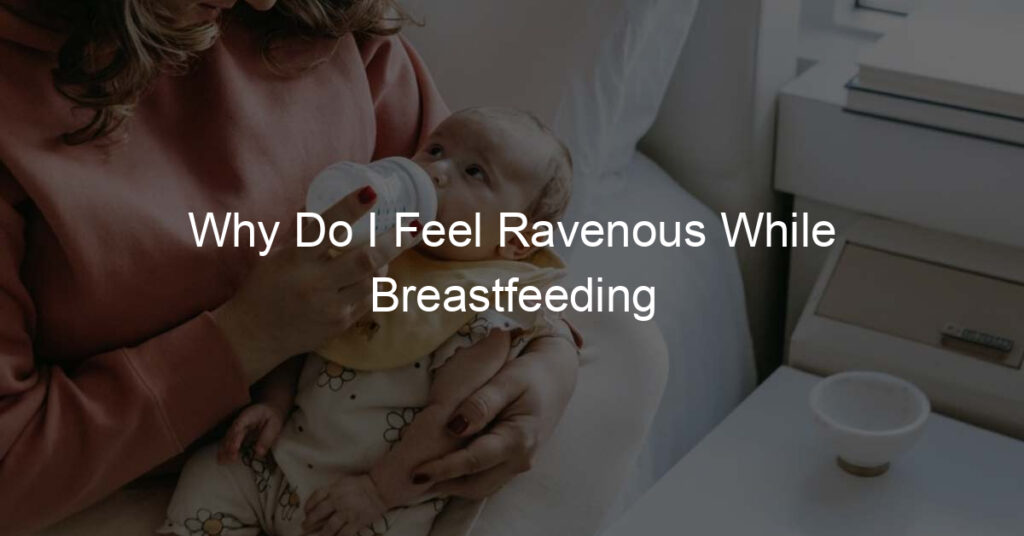Breastfeeding a newborn can be an incredibly rewarding experience for both mother and child, yet breastfeeding often comes with its own set of challenges. One particularly common challenge many mothers experience is feeling ravenous while nursing their babies.
The hormones that regulate milk production make it difficult to feel full in between meals, which may lead to frequent snacking or binging on unhealthy food. If you’re constantly hit with cravings while breastfeeding, there are some ways you can combat them without sacrificing your long-term health goals!
In this blog post, we’ll explore why breastfeeding might impact your hunger levels and offer practical tips on how to stay nourished and sated whilst feeding your baby.
Why do I get extreme hunger when breastfeeding?
Nursing a child can be one of the most rewarding experiences in a woman’s life, but it can also come with some unexpected challenges – one of which is feeling extreme hunger. When a woman is breastfeeding, her body needs extra calories and nutrients to produce sufficient milk.
Her body often responds with increased feelings of hunger that may be more aggressive than usual. Thankfully, there are ways to cope with the sensation while still nursing your baby. Eating healthy snacks throughout the day can help satisfy those cravings while helping to keep energy levels up, and starting your day off by eating a well-balanced meal can prevent any unnecessary snacking down the line.
Everyone has different nutritional needs and habits for breastfeeding, but these tips should help you get started on taking care of your own health and wellness along with your baby!
Can a breastfeeding mother take a super appetite?
It is important to exercise caution when considering whether or not a breastfeeding mother can take Super Appetite. While this product is safe to use while feeding, it should not be taken as a substitute for professional medical advice. The possible side effects of taking the supplement should be carefully weighed against the potential benefits and if there are any questions or concerns, consulting with a healthcare provider is recommended.
In addition, it’s important to ensure that the supplement being taken is free from toxins and has been manufactured under good manufacturing standards before it is consumed. Though Super Appetite may have benefits for people who are trying to increase their appetite, breastfeeding mothers must do so with many safety considerations in mind.
How can you tell the difference between comfort and hungry breastfeeding?
Breastfeeding can be a difficult task for new mothers. One of the most important things to understand is the difference between when your baby is comfort nursing, and when they are actually hungry. When your baby is comfort nursing, you may notice that they do not take long gulps or make loud sucking sounds; rather, there will usually be shorter pauses, making it seem more like a pacifier.
Furthermore, during comfort nursing, your baby may open their mouth very slowly and their jaws may not move as vigorously. On the other hand, when they are actually hungry they will often lunge forward with a strong suckling motion and slurp eagerly – giving clear signs that they need nourishment!
When does breastfeeding hunger stop
Breastfeeding hunger can stop any time throughout the first year, but it is typically sometime around 6 months and 2 years of age. It is important to note that all babies are different, and when they become less reliant on breastmilk for food can vary significantly. Factors like increased mobility, new teeth, and differences in appetite can all contribute to a baby’s transition away from breastfeeding.
Of course, the best way to know if your baby’s hunger has stopped is by keeping an eye out for cues from them. If you start to notice an aversion or lack of interest in latching on to or eating expressed milk, this may be a sign that your little one has moved on to bigger things.
Breastfeeding appetite out of control
Breastfeeding can often cause an appetite out of control for mothers, as the body needs extra calories to produce milk and energy. While the advice is plentiful about how to maintain a healthy diet when breastfeeding, it is hard for many mothers to stick to this as hunger levels seem almost insatiable.
If your appetite has run out of control during breastfeeding, then watch your portion size and try not to snack on unhealthy food items. Foods such as lean proteins, vegetables, and fruits are better options than processed sugars and fats.
Making adjustments like eating smaller meals more often or even indulging in the occasional sweet treat can help tame the hunger and make it easier for mothers who are breastfeeding to manage their diet better.
Summary
Breastfeeding is an amazing journey – both moms and babies can benefit immensely from exclusively breastfeeding. But even with all the wonderful benefits, there are times you may feel ravenous while breastfeeding. Fortunately, understanding why this happens and learning tips to manage it can make it easier to deal with.
After all, when mommy is well-fed, the baby is too! So if you’re worried about getting through long nursing sessions, remember that eating the right way will help boost your energy levels. Asking for help from friends and family when needed and scheduling time to rest can also help reduce feelings of exhaustion or overwhelm during the breastfeeding journey.
Finally, don’t forget to look after yourself and practice self-care. You deserve it as a new mom!














